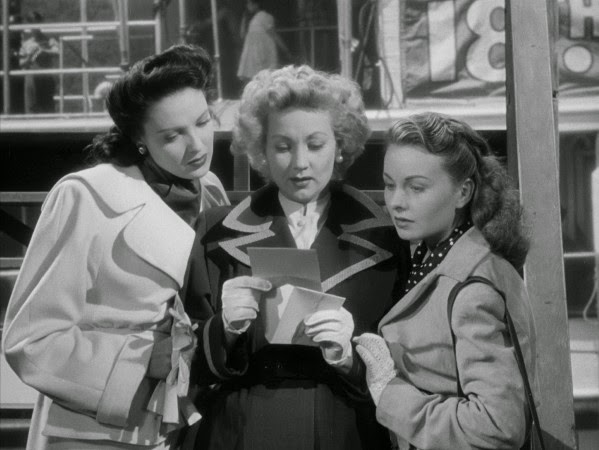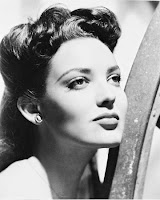Based on a Cosmopolitan story, the film owes its roots to The Women, but tops it in terms of psychology and structure, while still maintaining that film's level of cattiness.
That is provided by the opening narration by one Addie Ross (voiced by Celeste Holm in a creepy "know-it-all" tone that reminded me of the disembodied voice-overs of "Desperate Housewives"). She sets the scene—and the motion picture—by moving away from the New York suburb from her "friends" Deborah Bishop (Jeanne Crain), Rita Phipps (Ann Southern), and Lora Mae Hollingsway (Linda Darnell), and leaving them all a "good-bye" note, the dear thing, on the very day all three women are out of town helping underprivileged children at a day-camp.
Thoughtful, but not in a good way. Scheming, more like it. The letter from Addie (known for always doing "the right thing at the right time") has a zinger of a farewell—informing the three that she has taken one of their husbands with her. And to rub salt in the wound, she doesn't even tell them which one.
Bitch.
All three husbands (Jeffrey Lynn, Kirk Douglas and Paul Douglas, respectively) had been acting a little reserved and distant that morning, off to their little pursuits, knowing full well the wives are doing some community service that they're committed to. They'll be gone all day, leaving the men to whatever rendezvous awaits them. They hadn't given it a second thought before. Now, it's all they can think about.
 |
| Darnell, Southern and Crain look at the last telephone they'll see all day. |
As the women move forward to that day-camp across the lake, all they can do is move backwards and reminisce about their marriages, what's right and what's wrong (and one of the things that's wrong they all share—their husbands think the world of Addie Ross). All afternoon, when they should be thinking of others, they are at their most self-absorbed. There's not even a pay-phone (pay-phone? Yes, kids, there was such a thing) out at that camp for them to ring home in the hope someone answers.
They all have their issues: Deborah met husband Brad during the war and had no ties to his small-town roots. She was an outsider who inherited the Phipp's, the Hollingsway's...and Addie. They were all chummy and comfortable and Deborah is anything but...wanting to make a good impression, but knowing she has a lot of time and history to make up. Her first "coming-out" get-together with the couples at "the club" does not go well—her dress is none-too-stylish (although Rita does some alterations that are altogether flimsy) and to loosen up, she gets a little tipsy. Then, that galoot of a husband, Brad, decides to whirl her around the dance floor, creating one of Mankiewicz's few attempts at enhanced POV.
 |
| Deborah on the dance floor... |
 |
| Darnell, Ford, Southern and Douglas in an alcoholic haze. |
 |
| Sisterly conflict (with Thelma Ritter sparring) |
So who's the philandering husband? Not saying. From the writer-director perspective synching with the wives', it could be any of them, and Mankiewicz (the writer) has fun dropping clues and suggestions. It will keep you guessing...except that Mankiewicz crafted a clever soap-opera. The next year, he would oversee his masterpiece—All About Eve.









No comments:
Post a Comment